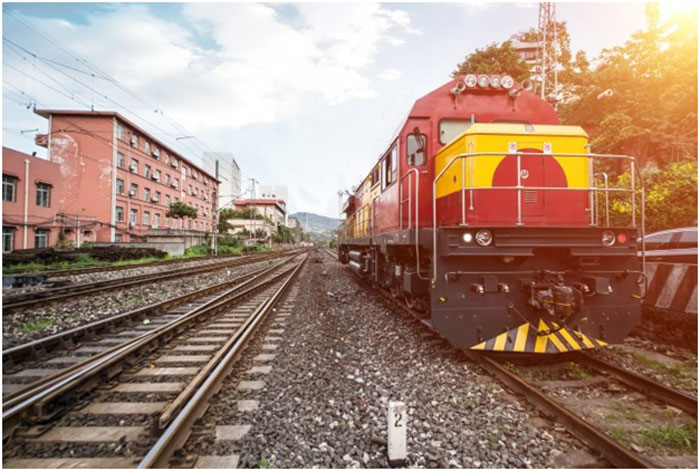
Have you ever thought of having a career in the railroad industry? If you are a great mechanic, possess organizational and clerical skills, and enjoy people, you might want to consider it.
Career Overview
In addition to the qualities listed above, most jobs in the railroad industry require a high school diploma.
And if you do get a job with a railroad, you must join a labor union. Unions negotiate salaries, hours, and benefits for railroad workers. Most railroad workers receive benefits such as health and life insurance and retirement plans. Some may also receive paid sick and vacation days. Once you are a union member, it is easier to advance since jobs usually go to union members first.
The down side is jobs in the railroad industry have become harder to find, since more people travel by plane than by train, and many freight trains have become automated through the use of highly specialized computers. However, jobs will always be available for qualified people.
Conductors
Conductors are responsible for the general safety of passengers, crew, and freight aboard the train. They usually inspect each train car and supervise any repairs. Conductors collect fares and tickets, and they provide information to passengers.
Conductors must keep accurate records of each trip. Good clerical and people skills are necessary to deal with both passengers and the crew in a friendly and helpful way. Conductors must know the signals, train schedules, and company rules.
Railroad conductors usually begin their careers as brakemen. Brakemen, who can be either men or women, operate and repair brake systems. Good mechanical skills are required. Promotions are based on the seniority system, which means that people who have worked at the company longest, have the best chance for promotion. Possession of the proper education and skill set increase the potential of promotion as well.
Other Careers in the Railroad Industry
Railroad engineers
Railroad engineers usually operate diesel engines that power both freight and passenger trains locally and across the country. Engineers must understand how the diesel engine works and be able to make minor repairs to trains in the rail yard. They move passenger and freight cars to the rail yard before and after a trip or run. They are also responsible for regular inspections of the train's mechanical parts. In addition, an engineer needs to understand track operating rules and signals.
Engineers often begin their careers as firemen. Firemen assist in the safe operation of the train, acting as assistant engineers. Many firemen enter engineer training programs to become railroad engineers.
Engineers and firemen receive on-the-job training as well as classroom instruction. Learning standard procedures and company rules and regulations is essential for operating a train safely.
To become an engineer or a fireman, a high school diploma is necessary. You must also be between the ages of eighteen and thirty-five. The salary range for engineers is from $53,000 to $65,000 a year. For firemen the range is from $30,000 to $50,000 a year.
Working hours vary from forty to sixty hours a week. Engineers and firemen are often on call—meaning that when they are at home, they are available to be called in to work if needed. Maintaining good strength and endurance is important since these jobs are physically demanding.
Railroad Brake, Signal, Switch Operators
Railroad brake, signal, and switch operators use, maintain, and repair brakes, signals, and switches that are required for the safe and efficient operation of trains. These workers must have excellent mechanical skills and physical strength. Training is usually on-the-job. The salary range is from $42,000 to $55,000 a year.
Railroad Maintenance Workers
Railroad maintenance workers keep trains, engines, and equipment in good working condition. These jobs include: car repairers, machinists, boilermakers, electrical workers, sheet metal workers, and blacksmiths. Each job requires a different level of technical training.
Railroad maintenance workers must have excellent mechanical skills as well as physical strength and endurance. The salary range is from $25,000 to $35,000 a year.
Track Maintenance Workers
Track maintenance workers maintain and repair rails and track beds in order to keep the train tracks in good condition. Most of this work is done outdoors, which means working in all kinds of weather. Physical strength and endurance are essential.
A high school diploma is preferred for track maintenance workers. On-the-job training is provided. The salary range is from $20,000 to $25,000 a year.
Railroad Telegraphers & Tower Operators
Railroad telegraphers and telephone and tower operators are responsible for the maintenance, repair, and operation of the communication systems between trains and stations. For these jobs, high school graduates with some technical, computer, communication, or electrical training are preferred. The salary range is from $35,000 to $45,000 a year.
Railroad Station Ticket Agents
Railroad station ticket agents sell tickets, maintain records, check baggage, and provide information to passengers. Some college experience may be helpful for becoming a ticket agent. Good clerical and people skills are necessary. The salary range is from $25,000 to $35,000 a year.
Questions to Ask Yourself
1) What type of railroad position appeals to you?
2) How can you learn more about that job?
3) With railroad positions becoming more limited, is this a career you still want to pursue?
Image Source: Freepik.com
